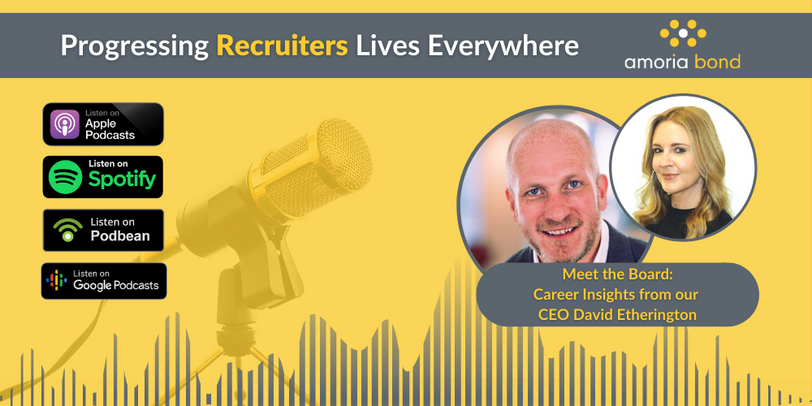
Effective communication is one of the most valuable tools you can make use of - acting as a catalyst to everything from establishing and maintaining a healthy business to progressing your own life in and out of the workplace.
On a recent episode of The Progressing Lives Everywhere Podcast, hosted by Timon de Haan, communication expert and founder of the Seventh-Wave, Nick Booth, provided insights into the importance of strong communication skills and how this can positively affect individuals progress.
When speaking about using effective communication to progress lives, Nick says: "In terms of progression, I think it's giving everybody the opportunity to be the best version of themselves they can be."

Tailor your communication to the individual's energy type
We all have unique personalities. When it comes to effective communication, it's essential to pay attention to this and tailor your approach to the individual's preferences to help them progress their lives.
During the conversation with Timon, Nick referred to these preferences as four defined energy types. These energy types were inspired by the late Swiss psychiatrist Carl Jung and relate to the thinking and feeling of introversion and extroversion.
- Red Energy
This extrovert is logical, driven and focused. - Yellow Energy
An extrovert who wears their heart on their sleeve. - Green Energy
This introvert has green energy and will be caring and analytical. - Blue Energy
A logical, precise and careful introvert.
Although individuals will be dominant in one energy, Nick stressed we are all a blend of all four energies. For example, you may be more red energy at work but have blue energy at home. Nick said: "one thing that we express and focus on is no one is one colour; everybody is a blend of all four."
You don't need to change your approach for each individual completely. Instead, adjust and improve your communication skills to meet their preference. As Nick says: "reflective practice is so powerful in terms of changing your communication style (...) it's not going from north to south, it's adjusting your communication style slightly."
To get the best out of an individual through verbal communication, Nick says to "firstly, consider their colour energy (...) and think about how they would prefer to be communicated to." From here, you can begin to build a strong relationship with the individual.
Build a relationship
We've established everybody has different energy types and preferences in communication. However, when it comes to team building and developing a relationship with your colleagues, Nick reverts to his core principle "that in any relationship you have, you've taught that person how to treat you."
Essentially it would be best to take responsibility for how you communicate with others, which goes back to the phrase 'treat people the way you want to be treated'. If you speak in this way, you are more likely to build a successful relationship - ultimately progressing the lives of those with whom you share interactions.
If you're going to be overseeing an individual or a group for a length of time, the key is to be wholly overt and create a safe space for the individuals to be comfortable and open. In addition, it's essential you understand their preferred communication style and remove any fear the individual may have of you or a fear of failure in general, as Nick would mention.
"I will be completely overt. (...) I would have a chat with them about communication styles. I'd chat with them about where they think their preference lies.
One of the biggest things that can stop someone from progressing is fear of failure or fear of their boss, and they're normally combined. So, if we can take away that fear of failure and allow someone to be a little bit freer in that space, you can really progress lives extremely quickly."
Nick does refer to the 'boss' here, but this relates to any role. People often fear failure and those who sit above them on the company hierarchy. Taking away this element of fear allows the individual to progress.
The above would be echoed by Nick when he went on to say: "We have to be multi-dimensional as leaders, and we have to understand what their (the individual) drivers are, what are their motivations, what really gets them out of bed in the morning? And when we can connect with that, then it allows that person to flourish, become the best version of themselves they can be and then allow them to progress their lives."
Another critical element to building a relationship is to agree on the process with the team or individual - the work 'rules' as Nick mentions in the podcast.
Nick said: "We agree on the process. We agree on what a good day looks like. And then when you've agreed what a good day looks like, and they've failed, or they haven't done it, that's when you can have a better conversation with them."
To Nick's point, it's about being empathetic with the individual through your communication and tone of your voice. If someone hasn't hit their target, instead of kicking them while they're down, use effective communication to pick them back up.
Use active listening and break down the barriers to effective communication. Let the individual speak to help you understand where they went wrong. As Nick would say, ensure your "empathy is true" and your "intent is pure."
Doing this, Nick says, will mean the individual will be "much more likely to be honest with you. (...) Develop that relationship to become a trusting relationship, and then that individual is more likely to listen to you around his or her communication style."
Work on the individual's limitations
There will be times where individual performances drop. Here it's crucial to use effective communication to identify why the person is struggling and find a solution to get them back to their best.
As Nick says, speak with the individual to determine if they have a 'skill' or a 'will' issue. If it's a 'skill' issue, see if you can upskill the individual, and if it's a 'will' issue, look at ways to help motivate the individual.
Nick provided an example of both a 'skill' and will' issue during the podcast and how effective communication combined with care and intuitive leadership progressed the lives of the individuals. First, Nick mentioned a 'skill' issue he came across.
"One that I come across, most recently from two CEOs that I'm coaching, is the fear of public speaking. So that is a lack of yellow energy. They realised it's something they must do more of.
(...) One (of the CEOs I found) fascinating (was) learning to be a stand-up comedian.
It's a 12-week course, and then you do stand-up on a stage and do a set of 20 minutes. And he's doing that to face his fears because of his lack of yellow energy in my language. So he's turning that up. He's working on that."
Nick would tell a story of an individual who had a 'will' issue and the company's steps to provide what was, in essence, a simple solution.
"A really high performing sales individual was loving life in the office, loved it. COVID hit, lockdown, back at home, sitting in his spare room on the edge of a bed, trying to use a laptop and his sales went off a cliff.
So it wasn't even a skill issue. It was a huge motivational issue. So the business that we were working with, they sent him round an office chair. They created this small environment at home for him and his sales went back up."
If you have an individual who has limitations, have a face to face conversation with them and openly talk about it. When doing so, use emotional intelligence, ensure you are in a safe space, be non-judgemental and provide complete confidentiality.
An excellent method Nick uses is a SWOT analysis. Allowing the individual to carry out a SWOT analysis on themselves lets them show you their limitations. Then go through the SWOT with them, look at it from their point of view, use your listening skills and see how you can help them progress.
As Nick says: "if you're going to get progressive lives everywhere, I think it's about progressing the individual by thinking through their eyes, by living in their world and walking in their shoes and seeing their world from their perspective."
Communicate with the individual, agree on their limitations, be it 'skill or 'will', and offer a solution to help them unlock their potential. Ultimately their success will be your success.
__________________________________________________________________
Listen to the conversations with Nick and Timon on Apple Podcasts or by searching for 'Progressing Lives Everywhere' on your preferred podcast platform.
Alternatively, you can watch the full unedited interview with Nick via the link below.
Progressing Lives Through Releasing Your Energy for Maximum Impact with Nick Booth
If you're looking for a specialist who has the effective communication skills to progress your business or are looking to unlock your potential, contact us today and discover how Amoria Bond recruitment services can help.





